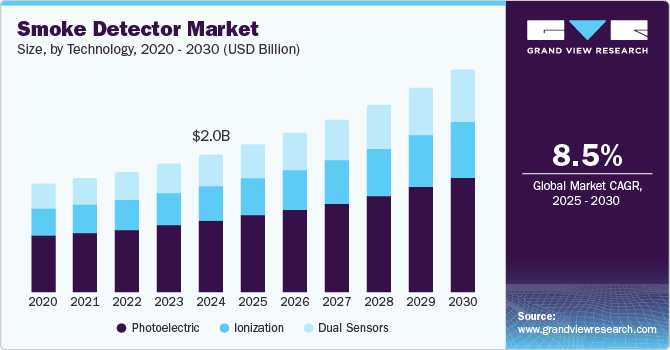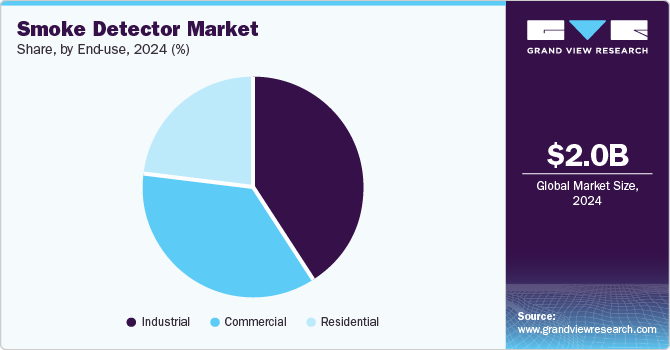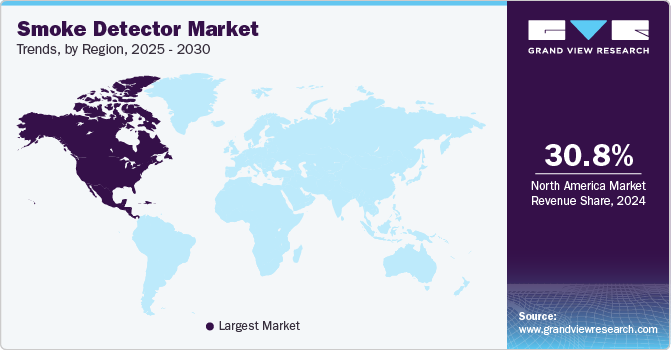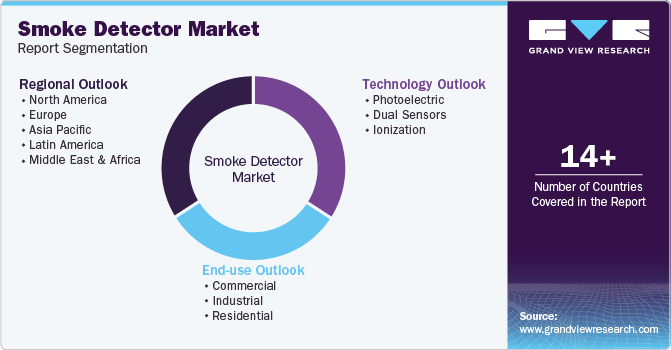- Home
- »
- Electronic & Electrical
- »
-
Smoke Detector Market Size, Share & Trends Report, 2030GVR Report cover
![Smoke Detector Market Size, Share & Trends Report]()
Smoke Detector Market Size, Share & Trends Analysis Report By Technology (Photoelectric, Dual sensors, Ionization), By End Use (Commercial, Industrial, Residential), And Segment Forecasts, 2025 - 2030
- Report ID: GVR-3-68038-099-6
- Number of Report Pages: 80
- Format: PDF, Horizon Databook
- Historical Range: 2018 - 2023
- Forecast Period: 2025 - 2030
- Industry: Consumer Goods
Smoke Detector Market Size & Trends
The global smoke detector market size was valued at USD 2.01 billion in 2024 and is expected to expand at a CAGR of 8.5% from 2025 to 2030. The increasing government initiatives and regulations mandating the installation of smoke detectors in both commercial and residential spaces are key drivers of the market growth. These regulations aim to enhance safety and prevent fire-related casualties, boosting the demand for smoke detectors. Additionally, advancements in smoke detection systems, such as integrating the Internet of Things (IoT) and artificial intelligence (AI), significantly contribute to market growth.

These smart smoke detectors offer enhanced features like real-time monitoring and remote alerts, making them more appealing to consumers. Furthermore, the rising awareness about fire safety and the growing adoption of smart homes are also propelling the market growth. As more people recognize the importance of fire detection systems, the demand for advanced smoke detectors continues to rise, supporting the market’s expansion.
The increasing urbanization and industrialization across emerging economies lead to a higher demand for fire safety systems in new infrastructure projects. This trend is particularly evident in regions like Asia Pacific, where rapid urban development is underway. Moreover, the rising disposable incomes and improving living standards encourage consumers to invest in advanced home safety devices, including smoke detectors. The hospitality industry is also a significant driver, as hotels and resorts prioritize guest safety by installing state-of-the-art smoke detection systems.
Additionally, the growing trend of smart cities fosters the adoption of interconnected and intelligent fire safety solutions, further propelling the market. Insurance companies also offer incentives and discounts on premiums for properties equipped with certified smoke detection systems, motivating property owners to install these devices.
Technology Insights
Photoelectric dominated the market with the largest revenue share of 52.0% in 2024. The dominance of photoelectric detectors is due to their superior performance in detecting slow, smoldering fires, which are more common in residential and commercial settings. Unlike ionization detectors, which are more responsive to flaming fires, photoelectric detectors use a light source and a light sensor to detect smoke particles, making them highly effective in identifying the early stages of a fire. The increasing awareness of fire safety and the preference for more reliable and efficient smoke detection solutions have driven the adoption of photoelectric smoke detectors. Additionally, technological advancements have led to the development of more sophisticated photoelectric detectors with enhanced features, such as wireless connectivity and integration with smart home systems, further boosting their popularity and market share.
Dual sensors are expected to grow at the fastest CAGR of 8.9% over the forecast period. This growth is driven by the superior safety features of dual sensor detectors, which combine photoelectric and ionization technologies. This combination detects slow, smoldering, and fast-flaming fires, providing comprehensive protection and reducing the likelihood of false alarms. The increasing awareness of fire safety and the demand for more reliable and efficient smoke detection systems are also significant drivers. Additionally, advancements in smart home technology and integrating dual sensor detectors with home automation systems make these devices more appealing to consumers. The growing trend of smart cities and the emphasis on enhanced safety measures in residential and commercial buildings further contribute to the segment’s robust growth.
End Use Insights
The industrial segment dominated the market with the largest revenue share in 2024. This dominance is driven by the stringent safety regulations and standards imposed by governments and regulatory bodies across various countries, which mandate the installation of smoke detectors in industrial facilities. The high risk of fire hazards in industrial settings, such as manufacturing plants, chemical factories, and oil and gas facilities, necessitates using advanced smoke detection systems to ensure safety and compliance. Additionally, the increasing adoption of automation and smart technologies in industrial operations has led to integrating sophisticated smoke detectors that provide real-time monitoring and alerts.

Residential is expected to grow at the fastest CAGR over the forecast period. Several factors, including the increasing awareness of fire safety among homeowners and the rising adoption of smart home technologies, drive this rapid growth. As more consumers become aware of the importance of early fire detection, the demand for advanced smoke detectors in residential settings is rising. Additionally, the integration of smoke detectors with smart home systems allows for enhanced features such as remote monitoring, real-time alerts, and seamless connectivity with other smart devices, making them more attractive to homeowners. The growing trend of urbanization and the expansion of residential construction projects, particularly in emerging economies, further contribute to the segment’s robust growth.
Regional Insights
North America dominated the global smoke detector market, with a revenue share of 30.8% in 2024. Stringent government regulations and fire safety mandates in the U.S. and Canada have significantly boosted the demand for smoke detectors. These regulations require the installation of smoke detectors in residential, commercial, and industrial buildings, ensuring widespread adoption. Additionally, the high incidence of fire-related accidents in the region has heightened awareness about fire safety, prompting individuals and businesses to invest in advanced smoke detection systems.

U.S. Smoke Detector Market Trends
The U.S. smoke detector marketis expected to grow significantly over the forecast period. The presence of major manufacturers and continuous technological advancements in smoke detection technology also play a crucial role in driving market growth. Innovations such as smart smoke detectors, which offer features like real-time monitoring and integration with home automation systems, are increasingly popular among consumers. Furthermore, the rising trend of smart homes and smart cities in the U.S. fosters the adoption of interconnected and intelligent fire safety solutions, further propelling the market.
Asia Pacific Smoke Detector Market Trends
Asia Pacific smoke detector market was identified as a lucrative region in 2024. Several factors, including the rapid urbanization and industrialization in countries such as China, India, and Japan, drive this robust growth. Expanding residential and commercial infrastructure in these regions creates a significant demand for advanced fire safety systems, including smoke detectors. Additionally, increasing government regulations and initiatives to enhance fire safety standards are propelling the adoption of smoke detectors across various sectors.
Europe Smoke Detector Market Trends
Europe's smoke detector market is expected to grow at the fastest CAGR of 8.9% over the forecast period. The stringent fire safety regulations and standards enforced by various European countries have significantly boosted the adoption of smoke detectors across residential, commercial, and industrial sectors. The high incidence of fire-related accidents and fatalities in the region has heightened public awareness and the need for effective fire detection systems. Additionally, expanding the residential construction industry, particularly in countries like Germany and Sweden, has further fueled the demand for smoke detectors.
Key Smoke Detector Company Insights
Some key companies in the smoke detector market include Honeywell International, ABB Group, Siemens AG, Hochiki Corporation, Johnson Controls International PLC, and others Companies are concentrating on launching new technology and expanding technology lines. Additionally, major players are implementing various strategic initiatives, such as mergers and acquisitions and partnerships with other leading companies.
-
Honeywell International is renowned for its advanced fire safety solutions, including a wide range of smoke detectors. Honeywell’s offerings include standalone and integrated systems catering to various residential, commercial, and industrial sectors. Honeywell’s smoke detectors are known for their reliability, ease of installation, and integration with smart home systems, providing real-time monitoring and alerts. The company’s focus on continuous innovation and adherence to stringent safety standards has solidified its position as a leader in the smoke detector market.
Key Smoke Detector Companies:
The following are the leading companies in the smoke detector market. These companies collectively hold the largest market share and dictate industry trends.
- Honeywell International
- ABB Group
- Siemens AG
- Hochiki Corporation
- Johnson Controls International PLC
- Robert Bosch GmbH
- Mircom Group
- Kidde Fire Safety (United Technologies Corporation)
- TycoFIS (Tyco International Ltd)
- Nittan Co., Ltd.
Recent Developments
-
In September 2024, Edwards announced the local production of Edwards Announces Launch of Signature Optica Smoke Detectors in India. The organization aims to leverage local infrastructure and talent to reduce lead times and enhance operational efficiencies.
-
In August 2023, Hikvision India expanded its safety equipment portfolio by launching a new series of Standalone Smoke and Gas Detectors, targeting both residential and commercial sectors.
Smoke Detector Market Report Scope
Report Attribute
Details
Market size value in 2025
USD 2.16 billion
Revenue forecast in 2030
USD 3.25 billion
Growth Rate
CAGR of 8.5% from 2025 to 2030
Base year for estimation
2024
Historical data
2018 - 2023
Forecast period
2025 - 2030
Quantitative units
Revenue in USD million and CAGR from 2025 to 2030
Report coverage
Revenue forecast, company ranking, competitive landscape, growth factors, and trends
Segments covered
Technology, end use, region
Regional scope
North America, Europe, Asia Pacific, Latin America, MEA
Country scope
U.S., Canada, Mexico, Germany, UK, France, Italy, Spain, China, Japan, India, South Korea, Australia, Brazil, and South Africa
Key companies profiled
Honeywell International; ABB Group; Siemens AG; Hochiki Corporation; Johnson Controls International PLC; Robert Bosch GmbH; Mircom Group; Kidde Fire Safety (United Technologies Corporation); TycoFIS (Tyco International Ltd); Nittan Co., Ltd.
Customization scope
Free report customization (equivalent up to 8 analysts working days) with purchase. Addition or alteration to country, regional & segment scope.
Pricing and purchase options
Avail customized purchase options to meet your exact research needs. Explore purchase options
Global Smoke Detector Market Report Segmentation
This report forecasts revenue growth at global, regional, and country levels and provides an analysis of the latest industry trends in each of the sub-segments from 2018 to 2030. For this study, Grand View Research has segmented the global smoke detector market report based on technology, end use, and region:

-
Technology Outlook (Revenue, USD Million, 2018 - 2030)
-
Photoelectric
-
Dual Sensors
-
Ionization
-
-
End Use Outlook (Revenue, USD Million, 2018 - 2030)
-
Commercial
-
Industrial
-
Residential
-
-
Regional Outlook (Revenue, USD Million, 2018 - 2030)
-
North America
-
U.S.
-
Canada
-
Mexico
-
-
Europe
-
Germany
-
UK
-
France
-
Italy
-
Spain
-
-
Asia Pacific
-
China
-
Japan
-
India
-
South Korea
-
Australia
-
-
Latin America
-
Brazil
-
-
Middle East and Africa (MEA)
-
South Africa
-
-
Share this report with your colleague or friend.
![gvr icn]()
NEED A CUSTOM REPORT?
We can customize every report - free of charge - including purchasing stand-alone sections or country-level reports, as well as offer affordable discounts for start-ups & universities. Contact us now
![Certified Icon]()
We are GDPR and CCPA compliant! Your transaction & personal information is safe and secure. For more details, please read our privacy policy.
We are committed towards customer satisfaction, and quality service.
"The quality of research they have done for us has been excellent."





